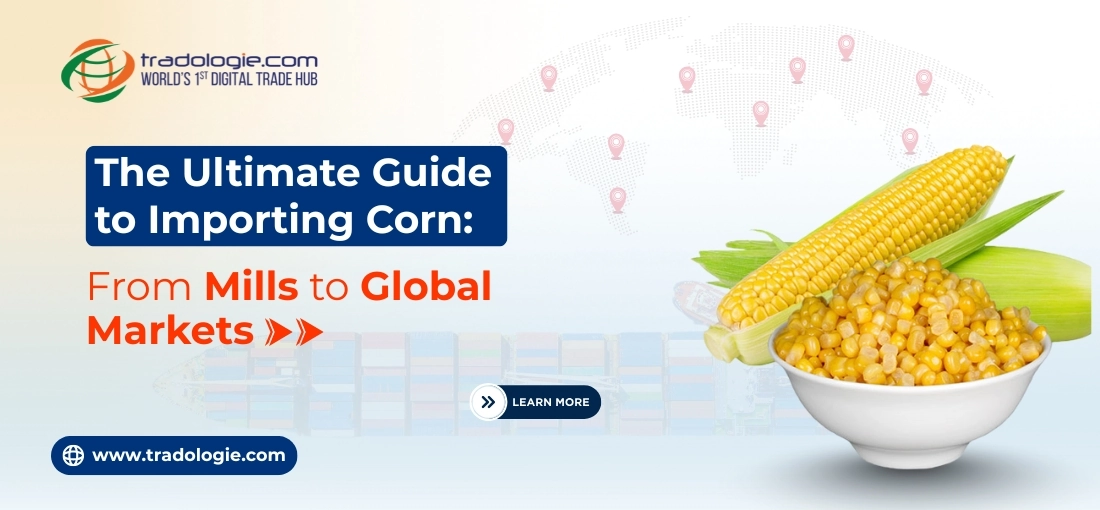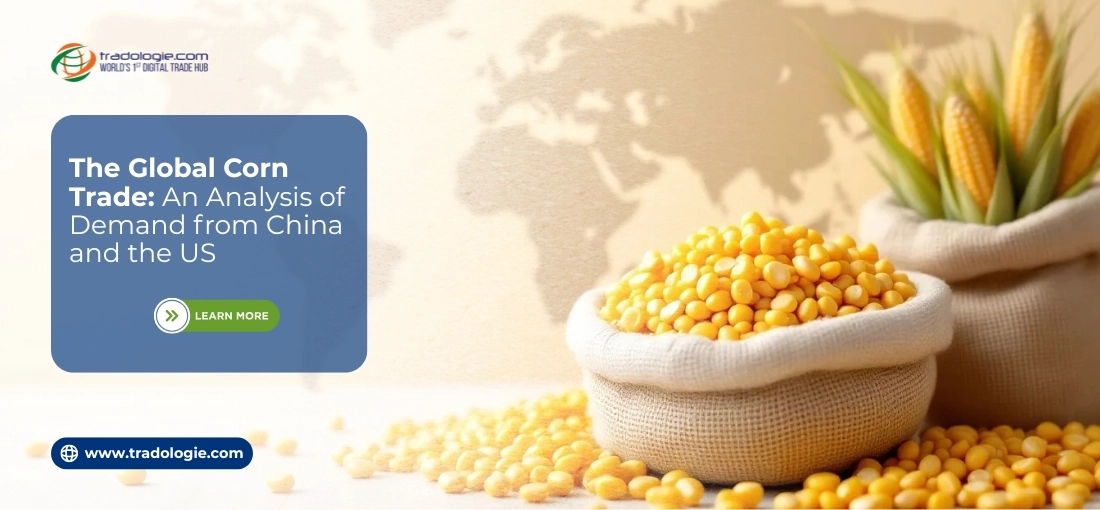The Ultimate Guide to Importing Corn: From Mills to Global Markets
Corn's Strategic Relevance in Global Trade
The day of fortune is like a harvest day. We must be busy when the corn is ripe. This is one of the most exquisite pieces of analogies between corn and the quest for success.
This magnificent golden harvest is not just a commodity; it is a vital lifeline for a wide range of industries. Valued at $56.7 billion in 2023, it caters to the needs of food manufacturers, starch processors, animal feed makers and ethanol producers worldwide.
You are at the right place if you are a bulk corn importer. This informative blog piece will provide you with the most vital b2b information on exporting corn from Mills to the global markets. So, let us get the ball rolling.
Who Moves the Global Corn Market?
Understanding the top countries that export corn will assist in shaping your procurement strategies and expedite the shipments to your port. These are the top countries that dominate the global export market owing to their widespread cultivation locally.
- Brazil ($14.4B, 2023): The country's yellow dent corn finds its way into Asian and Middle Eastern feed mills, where volume consistency and cost-efficiency remain procurement priorities.
- United States ($14.4B): U.S. corn, both yellow dent and white, is leveraged by bulk corn importers requiring high-certification standards for industrial-grade starch, sweeteners, and ethanol production lines.
- Argentina ($6.62B): Argentine corn meets seasonal demands for North African and Asian markets, often integrated into feed production for poultry and cattle sectors requiring steady bulk shipment contracts.
For buyers, it becomes vital to secure the right commodity with the right origin based on technical parameters and shipment schedules, as each exporter country offers specific grades, moisture profiles, and compliance levels that influence downstream processing outcomes.
Core Principles for Effective Corn Export Operations
Track Record and Compliance Matter
Haven't you heard of a common saying that it takes a moment to lose reputation? In bulk commodity trade, reputations are earned through transparency and consistency, which takes a lot of time to develop. It's an industry that is highly prone to delays and defaults, which can lead to a considerable sum of economic loss. The geographical distance makes it both challenging and impractical to take legal action against the supplier. Before contracting, corn importers should examine:
- The supplier's historical shipment records.
- Compliance certifications (mycotoxin, moisture, pesticide residue control).
- Experience in managing bulk shipments with aligned documentation processes.
Shortlisting suppliers with a proven record in fulfilling institutional orders reduces operational risk. The b2b commodity platforms that show the corn suppliers' complete portfolio and catalogue, and employ a rigorous verification process before onboarding a supplier, can be of great assistance.
Price Benchmarking with Verified Quotes
Price discovery is an art that requires gathering structured quotations from multiple verified suppliers rather than speculative negotiations. Procurement teams typically:
- Request detailed quotes with clear terms on shipment timelines and quality parameters.
- Benchmark pricing across origins to capture seasonal and regional cost efficiencies.
- Avoid reliance on intermediaries by engaging directly with primary suppliers.
This highly systematic approach gives assurance that the pricing is in sync with the actual market conditions while preserving shipment reliability. Again, platforms that provide access to multiple quotes from global corn suppliers can simplify in selecting the best offer. This real-time price discovery feature comes in handy when the procurements are big and timelines are tight.
Contracting Aligned with Industrial Needs
Contracts in the corn trade should not be generic but tailored to the trade needs. Every single aspect of documentation, like Letter of intent, buyer-seller agreement, sale purchase agreement, and payment terms, should focus on the utmost tiny details that both parties must utuboth.
- Clear quality metrics on moisture levels, broken grain percentages, and foreign matter.
- Packaging type based on volume (bulk vessel charters or containerized shipments).
- Payment terms aligned with delivery timelines to ensure working capital efficiency.
Structured contracts mitigate disputes at destination ports, preserve operational timelines, and ensure buyers do not incur unplanned reprocessing costs.
Leveraging Digitisation for Efficiency
Digitisation in agro-commodity trade is no longer optional; it's the new reality of the industry. B2b commodity platforms that allow corn importers to request live, competitive quotes, evaluate supplier profiles, and finalise transactions transparently are now increasingly gaining relevance and becoming central to modern procurement teams that aim to seek control and clarity in bulk agro sourcing processes.
Such digital frameworks help eliminate confusion, reduce procurement lead times, and lower the cost of sourcing by enabling real-time supplier negotiations.
Market Dynamics and Strategic Sourcing
Seasonality plays a defining role in corn procurement. Brazil and Argentina's harvest cycles complement Northern Hemisphere production, allowing buyers to time procurements aligned with harvests, thus optimising landed costs.
Freight conditions also impact pricing structures, making it critical for buyers to evaluate shipping options—containerized shipments vs. bulk charters—based on volume and timelines.
Conclusion
In the structured corridors of global agro-commodity trade, corn remains a critical component in procurement pipelines. For buyers and institutional sourcing teams, success in corn trade is less about price chasing and more about precision, aligning with suppliers who offer consistency, apparent compliance, and shipment reliability.


